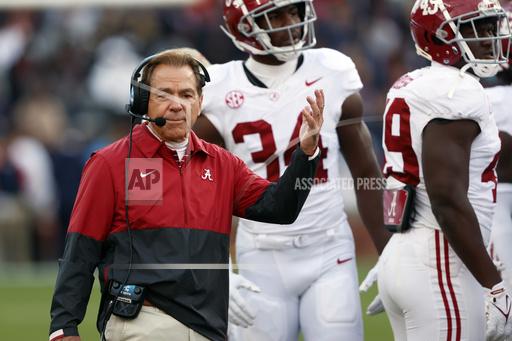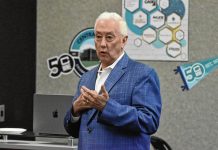Cummins Inc.’s president and chief operating officer will be in Washington, D.C., this week to talk to congressmen about issues of concern to the company. That includes the Deferred Action for Childhood Arrivals program.
President Trump said last week that he’s rescinding President Obama’s 2012 executive order for the DACA program regarding young immigrants brought into the U.S. illegally as children — and allowed to stay in the country to work as young adults. Trump has asked Congress to come up with a replacement.
Rich Freeland, president and chief operating officer since 2014, and Cummins Chairman and CEO Tom Linebarger have been at the forefront of the national dialogue about the DACA program. Both have expressed support of those young adults, also referred to as “Dreamers.” Freeland spoke at a rally in support of the program Tuesday at Columbus City Hall.
Cummins not only wants to make good products, but do so in the right way, said Freeland, who has spent 38 years with Cummins.
[sc:text-divider text-divider-title=”Story continues below gallery” ]
That approach involves looking at issues such as DACA that affect stakeholders, Freeland said. Eliminating the DACA program would be bad for Cummins’ stakeholders, he said.
“We need and want a diverse, skilled workforce. We attract from all around the world. That involved H1B visas and DACA. We have employees who have come through the DACA program,” Freeland said.
“We’re not as good a company if we don’t have these employees,” he said.
Freeland and Linebarger are expressing the benefits of the DACA program to the highest levels of government.
Linebarger was among more than 400 business leaders who signed recent a letter sent to the Trump administration expressing support for DACA.
Freeland said he would be traveling to Washington and will meet with members of Congress to discuss issues of importance to Cummins, including trade, tax reform, immigration and DACA.
Freeland may be talking to different members of Congress than Cummins’ lobbying staff has talked to previously, company spokesperson Katie Zarich said.
His perspective on DACA is one of many insights Freeland can share directly with the company’s board of directors.
Freeland was named to the board in July, giving it an additional voice from the company’s leadership team, and one that offers perspective on the day-to-day operations that he oversees.
“A lot of my job now is making sure I’ve got us pointed in the right direction, and we’re gearing the whole organization to deliver on that,” said Freeland, who was promoted after leading the Engine Business.
Freeland is engaged in Cummins’ values and culture, as well as its products, technologies and markets.
New opportunity
Electrification is one of the new markets that Cummins has entered, and one in which it intends to lead.
Cummins launched its electrification business earlier this year to seize opportunities with commercial electric vehicles in urban markets, such as buses and delivery trucks.
Cummins’ electrification efforts are first focusing on powertrains. The company expects to have a fully electrified powertrain system to market for customers by the end of 2019, and an extended-range powertrain ready for customers by 2020.
On Aug. 29, Cummins unveiling of an electric-powered concept truck cab during a press event at the Cummins Technical Center on McKinley Avenue. The electric truck produces zero emissions and can travel 100 miles on a single charge.
Cummins’ vision is to be the leading powertrain producer for customers, whether it’s gas, diesel, hybrid or electric, Freeland said.
“If we’re to be relevant in this space, we can’t say we’re placing the whole bet on any one of these technologies. We don’t know how quickly or even eventually if any of these things change,” Freeland said.
Cummins’ chief operating officer said he believes the world will move toward electrification with vehicles, but the speed depends on factors such as reducing the costs of batteries, extending ranges for batteries and creating suitable charging infrastructure.
Markets for electric vehicles are likely to move quicker for those that are lighter weight and have a lower range of applications, such as those hauling lighter weight, school buses and urban buses, Freeland said.
He said he believes it will be at least a decade before over-the-road, long-haul, fully electric vehicles are economically viable to be produced in large quantities.
“We’re going to be using diesel to haul stuff across country for a long time, in my view. Will there be some electrification on those trucks? Will there be telematics on those trucks? Will they have automated powertrains? Yes, yes, yes. Will they be a pure electric vehicle? At least in one person’s opinion that’s quite a ways out,” Freeland said.
Self investment
Another area in which Cummins is investing is itself — namely the Corporate Office Building (COB), the company’s global headquarters located at 500 Jackson St. in downtown Columbus.
Cummins announced in July that it would invest $50 million in upgrades to the building where about 1,300 employees work. That investment was made in conjunction with an announcement by local and state leaders that a $30 million State Road 46 overpass project would be moving forward to alleviate traffic delays at the western entrance to the city, caused by a greater number of trains scheduled to come through the city.
Freeland described both announcements as important to the company’s future.
The company has about 3,500 employees working downtown and close to 8,000 in the Columbus area, Zarich said. A significant percentage of the employees live on the west side, she said.
The COB is a 40-year-old building in need of upgrades because its original interior design is no longer compatible with the current needs of employees, Freeland said.
“This is our headquarters. This will remain our headquarters. This is the heart of the company,” Freeland said.
The building changes will include more open, flexible and collaborative spaces, and less dedicated space, he said.
An improved work space at the COB combined with an overpass making it easier for Cummins residents living on the west side to get to work will be a huge benefit, Freeland said.
The chief operating officer said he spoke with state officials about the current and anticipated train traffic delays during the summer and explained the impact it could have on a Cummins employees getting to work.
Knowing an overpass would be needed to address the problem, Freeland said he asked for a commitment sooner because the company was planning upgrades to the COB — even though the company’s facilities and employees would be welcomed by other cities.
“I told them I am going to fix the building whether you do the overpass or not, but it just may not have as many people in it if we can’t get them to work,” Freeland said.
A collaboration between Columbus, Bartholomew County, the state of Indiana, the railroads and Cummins to reach a solution and fund the project — with the state paying half the cost — allowed the overpass project to move forward.
“What (the state) really wanted to do was have a model they could take to any community in Indiana and say, ‘If you do this, we can help solve your problem,'” Freeland said.
The overpass will allow the COB to remain the heart of the company for a long time, Freeland said.
Message still resonates
If the COB is the heart of the company, its soul is the vision former Chairman J. Irwin Miller had for Cummins with regard to doing things the right way and treating people fairly and with respect. Freeland said advice Miller gave to him more than 20 years ago still resonates with him today.
Freeland took over as plant manager of the Columbus Engine Plant — also known as Plant 1 — in the mid-1990s, and Miller invited him and the plant’s union president to his house for afternoon tea.
Miller told Freeland that running Plant 1 was a big responsibility because it was the heart of the company and had about 3,000 employees. Miller also offered two pieces of advice, Freeland said. Miller stressed that it was important for Freeland and Plant 1’s union president to work together well.
Miller’s second point was directed solely at Freeland.
“I want you to remember the wisdom of the workforce. This wisdom of knowing (how to make the engines) resides in (the union president) and those workers, so don’t ever lose respect for the workers,” Freeland said of Miller’s message.
Freeland said the message resonated because of his blue-collar background of growing up on a farm in Fowler, a small community northwest of Lafayette, and working one summer in a foundry.
“People want to work for bosses that treat them with respect, or they won’t keep working there and they’ll go someplace else,” Freeland said.
[sc:pullout-title pullout-title=”Read the DACA letter” ][sc:pullout-text-begin]
Here is the text of the letter more than 400 business leaders, including Cummins Inc. Chairman and CEO Tom Linebarger, signed and sent to the Trump administration regarding the DACA program:
August 31, 2017
To: President Donald J. Trump
To: Speaker Paul Ryan; Leader Nancy Pelosi; Leader Mitch McConnell; and Leader Charles E. Schumer
As entrepreneurs and business leaders, we are concerned about new developments in immigration policy that threaten the future of young undocumented immigrants brought to America as children.
The Deferred Action for Childhood Arrivals (DACA) program, which allows nearly 800,000 Dreamers the basic opportunity to work and study without the threat of deportation, is in jeopardy. All DACA recipients grew up in America, registered with our government, submitted to extensive background checks, and are diligently giving back to our communities and paying income taxes. More than 97 percent are in school or in the workforce, 5 percent started their own business, 65 percent have purchased a vehicle, and 16 percent have purchased their first home. At least 72 percent of the top 25 Fortune 500 companies count DACA recipients among their employees.
Unless we act now to preserve the DACA program, all 780,000 hardworking young people will lose their ability to work legally in this country, and every one of them will be at immediate risk of deportation. Our economy would lose $460.3 billion from the national GDP and $24.6 billion in Social Security and Medicare tax contributions.
Dreamers are vital to the future of our companies and our economy. With them, we grow and create jobs. They are part of why we will continue to have a global competitive advantage.
We call on President Trump to preserve the DACA program. We call on Congress to pass the bipartisan DREAM Act or legislation that provides these young people raised in our country the permanent solution they deserve.
[sc:pullout-text-end][sc:pullout-title pullout-title=”The Freeland file” ][sc:pullout-text-begin]
Who: Rich Freeland
What: Cummins Inc. president and chief operating officer
Age: 60
Resides: Columbus
Education:
- Earned a Bachelor of Science degree in industrial management from Purdue University’s Krannert School of Management
- Earned a Master of Business Administration degree from Indiana University’s Kelley School of Business
Professional background:
- Joined Cummins in 1979 at the Cummins Parts Distribution Center
- Plant manager of the Diesel ReCon Plant in Memphis, Tennessee
- Plant manager of the Columbus Engine Plant
- President of the Distribution Business
- President of the Components Business
- President of the Engine Business
- President and chief operating officer since 2014
- Board of directors Cummins Inc. since July
- Current member board of directors of Valvoline Inc.
- Current advisory board member for Purdue University’s Krannert School of Management
Community involvement:
- Past board member of Otter Creek Golf Course
- Past board member of the Heritage Fund — The Community Foundation of Bartholomew County
Family: Wife, Tammy; daughters, Lauren and Jill; three grandchildren
[sc:pullout-text-end][sc:pullout-title pullout-title=”Purdue recognition” ][sc:pullout-text-begin]
Rich Freeland will receive the Purdue University Krannert Distinguished Alumni Award at this year’s Krannert Leadership Speakers Series event Sept. 28 in Indianapolis.
Freeland earned a Bachelor of Science degree in industrial management from Purdue.
[sc:pullout-text-end]






